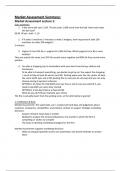Summary
Market Assessment Summary
- Course
- Institution
This is a summary of all lectures given for the course Market Assessment including notes. Additionally, the summary also includes several exam practice questions and all notes on the knowledge clips associated.
[Show more]



